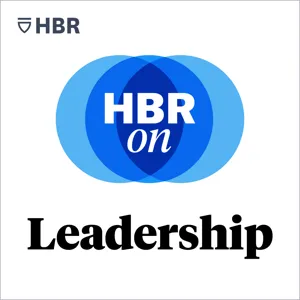Podcast Summary
Start your day with mindfulness practice for effective leadership: Practicing selflessness, mindfulness, and compassion as a leader enhances performance and connects you with your team
Effective leadership goes beyond power and public speaking skills, and instead, is rooted in mindfulness, selflessness, and compassion. Rasmus Huguard and Jacqueline Carter, authors of "The Mind of the Leader," argue that practicing selflessness as a leader doesn't make you a pushover, but rather, helps you connect with your team and prioritize effectively. They suggest starting your day with a mindfulness practice, such as a gratitude exercise, to deflate the ego and improve focus and engagement. By developing these characteristics, leaders can enhance their own performance and that of their teams.
Recognizing the importance of serving others: Selfless leadership is about balancing serving others with maintaining self-confidence, leading to increased trust, better performance, and personal growth for both the leader and team.
Selfless leadership is not about neglecting one's own interests or becoming a doormat for others. Instead, it's about recognizing the importance of serving the interests of one's people and organization, while maintaining a strong sense of self-confidence. This approach leads to increased trust, better performance, and the realization of potential for both the leader and their team. Research shows that selflessness, when paired with a healthy ego, is the sweet spot of effective leadership. By enabling others and putting them on stage, a selfless leader creates a more cohesive and productive team. This practice not only benefits the organization but also leads to personal growth and fulfillment for the leader.
Balancing Self-Confidence and Selflessness for Effective Leadership: Effective leadership requires a balance of self-confidence and selflessness to be patient, present, and compassionate, even in a distracted world.
Effective leadership requires a balance of self-confidence and selflessness. Selflessness without confidence can lead to being a pushover or a doormat, while low selflessness and strong confidence can result in egoism. To be a people-centered leader, it's essential to have the enabling quality of self-confidence and approach others with the intention of helping them have a better day. This approach, inspired by leaders like Ted Keshios of Cisco, can help leaders stay patient and present despite distractions and interruptions. Compassion is not just about pleasing people or giving them what they want; it's about doing the right thing and meeting their needs, even when they may not be able to see them. Practicing compassion can be challenging, but it's an essential component of effective leadership. In today's distracted and busy world, developing a clear, focused, and calm mind is crucial to being a compassionate and helpful leader.
Leading with Compassion and Wisdom: Combining compassion with wisdom in leadership can lead to improved employee engagement, better decision-making, and a more positive organizational culture.
Effective leadership involves combining compassion with wisdom. Compassion is essential, but it's not enough on its own. Leaders must also make tough decisions, even if they're not popular or pleasant. These decisions can be delivered with kindness and understanding, rather than tension and frustration. This approach may seem unconventional, but it's based on fundamental human needs – the desire to be happy, connected, and have a sense of meaning and purpose. Leaders who tap into these needs will have a positive impact on their organizations. This approach may be met with skepticism, but when put into practice, it can lead to improved employee engagement, better decision-making, and a more positive organizational culture. It's a counterintuitive approach, but one that is grounded in both logic and science.
Mindful Time Management: Using Your Most Focused Time Wisely: Practice mindfulness, prioritize tasks, plan effectively, and use your most focused time wisely for increased productivity.
Effective time management involves being mindful of when we're most focused and using that time for our most important tasks. This means setting priorities and goals with a long-term perspective, and being ruthless about managing our calendars. By practicing mindfulness, prioritizing, and planning, we can save valuable time and increase productivity. Research suggests that most of us have our most focused time first thing in the morning, so it's essential to use this time wisely. Successful leaders are known to be intentional about their calendars, canceling unproductive meetings and scheduling time for reflection. By implementing practices like 2 minutes of mindfulness, 2 minutes of prioritization, and 2 minutes of planning, we can improve our focus and make the most of our time. Overall, being mindful and focused can lead to significant time savings in our personal and professional lives.
Implementing mindfulness practices in the workplace leads to productivity gains: 30% time savings in meetings and emails, prioritize employees' well-being, and support colleagues for a people-centric organization
Implementing mindfulness practices in the workplace can lead to significant productivity gains. Carlsberg found that implementing mindful guidelines for meetings resulted in an average 30% time savings. By being more mindful with meetings and emails, organizations can save a considerable amount of time. Furthermore, cultivating mindful leaders can result in more people-centric organizations, where employees' well-being and sense of connectedness are prioritized. Marriott is an excellent example of a people-centric organization, with their business philosophy being "take care of our people, they take care of guests, and business takes care of itself." To put this advice into practice, listeners can start by taking a few minutes to focus on their breath and think about the next person they will meet and how they can support them.
Approach interactions with compassion to leave others feeling happier: By focusing on the happiness of others, we can lead ourselves, our teams, and our organizations to extraordinary results.
As leaders, we should strive to make a positive impact on the lives of those around us. Rasmus Hugard and Jacqueline Carter, authors of "The Mind of the Leader," emphasized this point during their conversation on the HBR Ideacast. They encouraged listeners to approach interactions with others with compassion, aiming to leave them feeling slightly happier. This mindset shift is not just about personal growth, but also about fostering a more positive and productive work environment. By focusing on the happiness of others, we can lead ourselves, our teams, and our organizations to extraordinary results. So, go out into the world with a stronger sense of compassion and make a commitment to making a positive difference in the lives of those you encounter.






